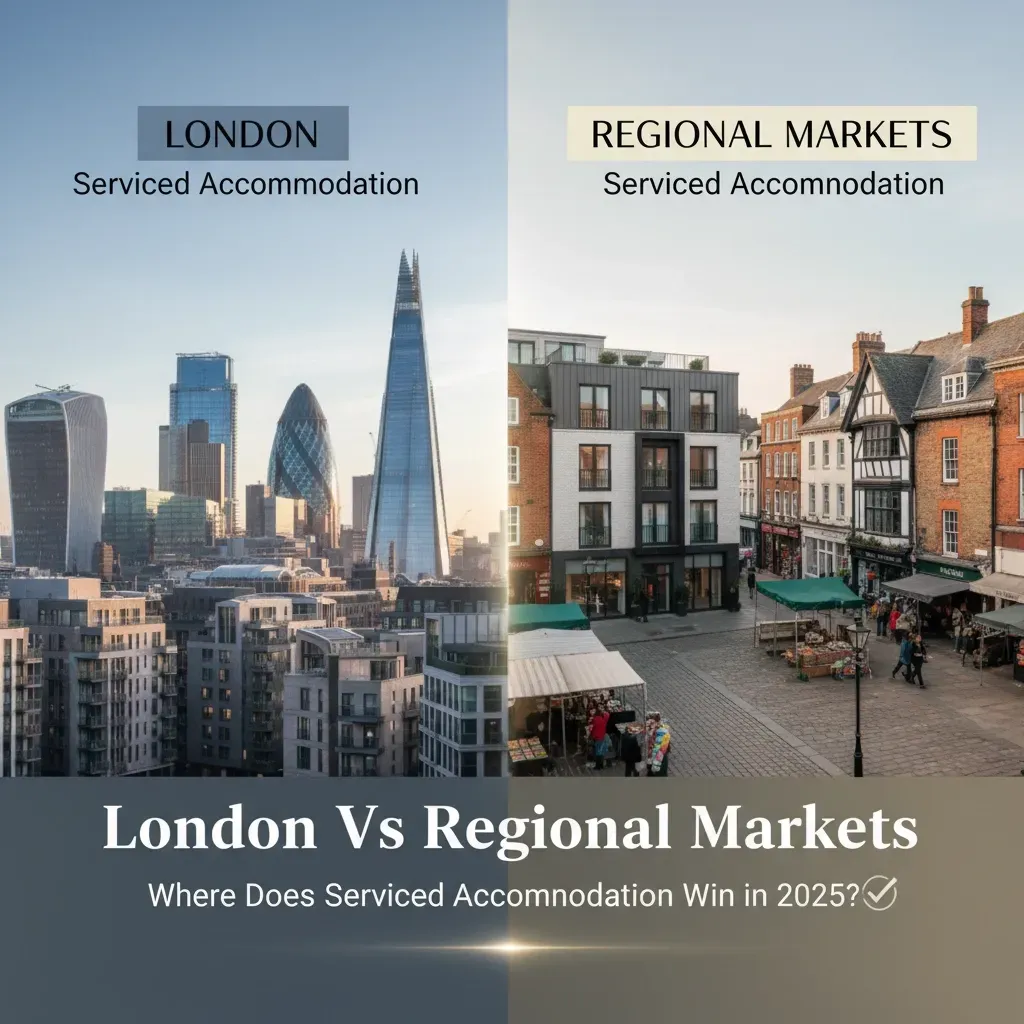
London Vs Regional Markets: Where Does Serviced Accommodation Win in 2025?
The short-term rental game has completely changed in 2025, and if you're still stuck in the traditional rental mindset, you're missing out on serious money. The UK serviced accommodation sector is projected to hit £8.82 billion by 2033, growing at 8.8% annually. But here's the thing: not all locations are created equal when it comes to making the switch from long-term tenants to short-term guests.
At Statera Estates, we help landlords navigate this transition every day, and the question we get asked most? "Should I focus on London or go regional?" The answer isn't as straightforward as you might think. Both markets are absolutely crushing it in 2025, but they're winning for completely different reasons.
Why London Still Rules the Short-Term Rental Game
Let's be honest: London isn't going anywhere. The capital continues to dominate with the highest occupancy rates across major European cities, and there's a reason for that. Corporate travel has bounced back hard, and companies are throwing money at proper accommodation for their staff relocations.
The London Advantage
London's short-term rental market thrives on one thing: premium corporate bookings. We're talking about tech companies, financial services, and consulting firms that need to house employees for weeks or months at a time. These aren't your typical weekend tourists: they're expense account clients who value quality over price.
The numbers don't lie. Direct bookings now account for 48% of revenue in the London market, and that's massive for landlords who've made the switch. When you're dealing with corporate clients through proper short-term rental management, you're looking at consistent bookings, higher nightly rates, and way less hassle than chasing individual tourists.

Plus, London's expat and relocation market is exploding: growing at over 10% annually. Post-Brexit corporate relocations mean more structured housing programs, and guess what? Companies prefer serviced apartments over hotels for their staff. It's more cost-effective for them, and more profitable for you.
The Reality Check
But let's not sugarcoat it. London comes with serious challenges. Property acquisition costs are through the roof, competition is fierce, and you're dealing with more regulatory red tape. Your operating costs will be significantly higher than anywhere else in the UK.
That said, if you can handle the initial investment and navigate the competition, London delivers stability. The demand is consistent, the rates are premium, and the market is mature enough that you know what you're getting into.
Regional Markets: The 2025 Success Story Nobody Saw Coming
Here's where things get interesting. While everyone's been obsessing over London, regional markets have quietly become absolute goldmines for smart landlords who've made the transition to short-term rentals.
Places like Morecambe, Preston, Rotherham, and Hull are experiencing serious growth. We're talking about previously overlooked locations that are now generating double-digit returns for landlords who got in early.
Why Regional Markets Are Winning
The secret sauce? Properties optimized for 2-12 week stays are absolutely destroying traditional nightly rentals in many regional towns. Think about it: contractors working on infrastructure projects, NHS staff on assignments, energy sector workers, and the growing army of digital nomads who want to escape London's crazy costs.
These markets work because they solve a real problem. There's a massive lack of quality accommodation in regeneration zones, and short-term rentals fill that gap perfectly. Your guests aren't tourists looking for the cheapest option: they're professionals who need proper accommodation for extended periods and are willing to pay for it.

The best part? Operating costs are a fraction of what you'd pay in London. Lower property prices, less competition, and guests who appreciate having a decent place to stay in towns that traditionally offered nothing but budget hotels or overpriced B&Bs.
Breaking Down the Numbers: London vs Regional
Let's get specific about what these markets actually offer landlords making the transition from traditional rentals:
London Performance
Occupancy: Consistently high, especially for corporate-focused properties
Nightly Rates: Premium pricing, particularly in zones 1-3
Operating Costs: High, but supported by strong revenue potential
Competition: Intense, with over 5,200 new rooms entering the market in 2025
Guest Profile: Corporate relocations, international assignees, high-spending business travelers
Regional Performance
Occupancy: Strong and growing, especially for 2-12 week bookings
Nightly Rates: Lower per night, but higher monthly yields due to extended stays
Operating Costs: Significantly lower across the board
Competition: Growing but still manageable in most locations
Guest Profile: Contractors, professionals, digital nomads, long-term work assignments

The Infrastructure Revolution Changing Everything
One thing that's completely shifted the game in 2025 is infrastructure investment. Regional areas with major projects: think energy, transport, and regeneration initiatives: are creating consistent, predictable demand for short-term accommodation.
This isn't seasonal tourist demand that fluctuates wildly. We're talking about contractors and professionals who need accommodation for months at a time, week after week. It's the kind of stable, mid-term booking pattern that makes transitioning from traditional rentals a no-brainer.
The technology side is worth mentioning too. AI and automation have made managing short-term rentals so much easier than even two years ago. Remote check-ins, automated guest communications, dynamic pricing: all the stuff that used to require constant hands-on management can now be handled efficiently.
Making the Right Choice for Your Portfolio
So, where should you focus when making the transition from traditional rentals to short-term lets? It depends on what you're trying to achieve and what you can realistically handle.
Go London if:
You've got serious capital to work with
You want to target corporate clients and business travelers
You can handle higher operating costs in exchange for premium rates
You prefer established markets with proven demand
You're comfortable competing in a saturated market
Go Regional if:
You're looking for higher net yields with lower entry costs
You want to get in early on emerging markets
You can identify areas with infrastructure projects or professional demand
You prefer less competition and more opportunity to establish yourself
You're targeting mid-term stays rather than nightly bookings

The Smart Money Is Going Hybrid
Here's what we're seeing work best in 2025: landlords who aren't putting all their eggs in one basket. The smartest operators are building portfolios that combine both London and regional properties.
London gives you stability, premium rates, and proven corporate demand. Regional markets give you higher yields, lower costs, and serious growth potential. Together, they create a balanced portfolio that can weather market changes and maximize overall returns.
This hybrid approach also lets you test different strategies. Maybe your London properties focus on corporate clients with direct bookings, while your regional properties target contractors and digital nomads through platforms and local partnerships.
The Bottom Line for 2025
Both London and regional markets are winning in the short-term rental space, but they're playing completely different games. The key is understanding which game matches your goals, resources, and risk tolerance.
What's clear is that landlords who've made the transition from traditional rentals to short-term lets are seeing significantly better returns across both markets. The serviced accommodation sector is expected to grow well beyond its current £1.7 billion valuation, and the opportunities are there for landlords who know how to position themselves properly.
The question isn't really whether London or regional markets are better: it's whether you're ready to make the transition from traditional rental income to the kind of returns that short-term accommodation can deliver in 2025.
If you're thinking about making the switch, now's the time. The market is mature enough to be stable but still growing fast enough to reward early movers. Whether you go London, regional, or hybrid, the opportunity is there for landlords who are ready to evolve with the market.
